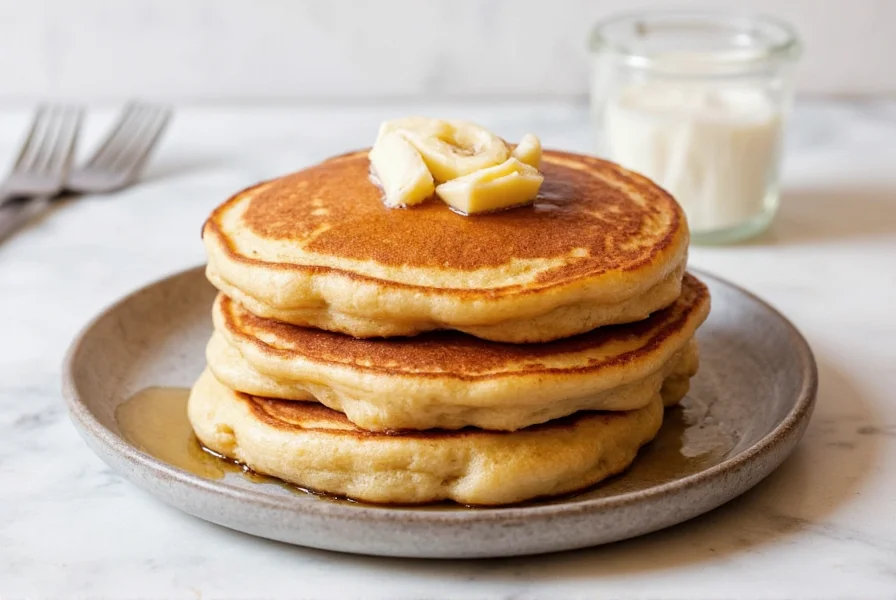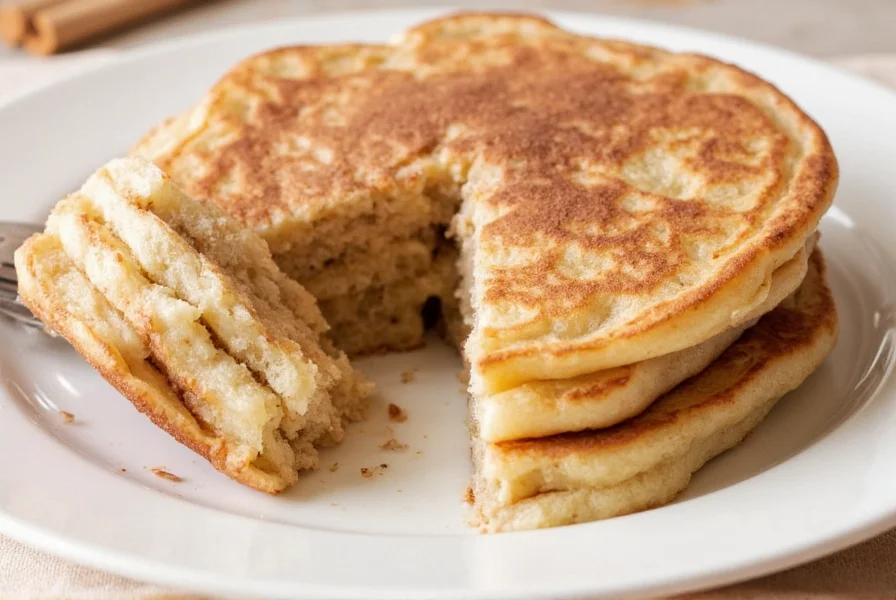For breakfast enthusiasts seeking to elevate their morning routine, cinnamon roll pancakes represent the perfect fusion of two beloved classics. Unlike standard pancakes, this recipe incorporates a cinnamon-sugar mixture directly into the batter layers, creating a marbled effect that mimics the spiral pattern of traditional cinnamon rolls. The result is a stack of pancakes with visible cinnamon swirls throughout, topped with a rich cream cheese glaze that completes the illusion of miniature cinnamon rolls.
What Makes Cinnamon Roll Pancakes Special
While regular pancakes offer a blank canvas for toppings, cinnamon roll pancakes build the flavor directly into the structure of the dish. The magic happens through a layering technique where you pour a portion of batter, sprinkle cinnamon-sugar mixture, then add more batter to trap the filling inside. This method creates pockets of molten cinnamon goodness that burst with flavor in every bite.
Food scientists note that the Maillard reaction—the chemical process that creates complex flavors during cooking—works particularly well with the sugar content in this recipe, producing deeper caramelized notes than standard pancakes. The addition of buttermilk in most recipes also contributes to both tenderness and a subtle tang that balances the sweetness.
Essential Ingredients Breakdown
Creating authentic cinnamon roll pancakes requires attention to ingredient quality and proportions. Here's what you'll need for the perfect batch:
| Component | Key Ingredients | Why It Matters |
|---|---|---|
| Pancake Base | All-purpose flour, baking powder, salt, buttermilk, eggs, melted butter | Creates light, fluffy structure that holds the cinnamon filling without becoming soggy |
| Cinnamon Filling | Granulated sugar, brown sugar, cinnamon, melted butter | Provides the signature swirl and molten pockets of flavor when cooked |
| Cream Cheese Glaze | Cream cheese, powdered sugar, milk, vanilla extract | Adds tangy sweetness that complements the cinnamon without overwhelming it |
Step-by-Step Preparation Guide
Follow these professional techniques to achieve restaurant-quality cinnamon roll pancakes at home:
- Prepare the batter: Whisk dry ingredients separately from wet ingredients, then combine just until mixed (lumps are okay). Overmixing creates tough pancakes.
- Create the filling: Mix sugars and cinnamon, then blend with melted butter to create a spreadable paste that won't sink through the batter.
- Layer strategically: Pour ⅓ of batter onto griddle, immediately spoon half the filling in spiral pattern, add more batter, repeat with remaining filling, then top with final batter layer.
- Cook at proper temperature: Maintain 375°F (190°C) on electric griddle—too hot causes burning before filling melts, too cool makes pancakes greasy.
- Flip carefully: Wait until bubbles form across surface and edges look set (about 2-3 minutes) before flipping to preserve the layered structure.

Pro Tips for Perfect Results
After testing dozens of variations, these techniques consistently produce the best cinnamon roll pancakes:
- Temperature control: Let batter rest 10 minutes before cooking—this allows flour to fully hydrate and creates more tender pancakes
- Filling consistency: If your cinnamon-sugar mixture sinks through the batter, add 1 tablespoon of flour to thicken it slightly
- Glaze timing: Apply cream cheese glaze immediately after cooking while pancakes are warm but not hot to prevent melting
- Swirl technique: Use a toothpick to gently swirl the filling in a circular pattern before adding the next batter layer for authentic cinnamon roll appearance
Common Mistakes to Avoid
Even experienced home cooks encounter these pitfalls when making cinnamon roll pancakes for the first time:
- Overmixing the batter: Creates tough, dense pancakes instead of light and fluffy texture
- Incorrect griddle temperature: Too hot burns the outside before filling melts; too cool makes pancakes greasy
- Adding too much filling: Causes structural issues and prevents proper cooking through the center
- Flipping too early: Breaks the delicate layered structure and causes filling to leak out
Serving and Storage Recommendations
Cinnamon roll pancakes taste best when served immediately after cooking, but you can store leftovers properly for later enjoyment:
- Immediate serving: Stack pancakes high and pour warm cream cheese glaze over the top for dramatic presentation
- Short-term storage: Keep warm in 200°F (95°C) oven for up to 30 minutes without drying out
- Refrigeration: Store cooled pancakes in airtight container for up to 3 days
- Reheating: Warm in toaster oven at 300°F (150°C) for 5-7 minutes to restore crisp edges while keeping interior tender
Popular Variations to Try
Once you've mastered the basic recipe, experiment with these creative adaptations:
- Apple cinnamon roll pancakes: Add finely diced apples to the filling layer for extra texture and flavor
- Maple pecan version: Replace cream cheese glaze with maple-pecan syrup and toasted pecans
- Overnight cinnamon roll pancakes: Prepare batter the night before for quick morning assembly
- Mini cinnamon roll pancakes: Make individual portions using a cookie scoop for bite-sized treats
Frequently Asked Questions
Can I make cinnamon roll pancakes without buttermilk?
Yes, you can create a buttermilk substitute by adding 1 tablespoon of lemon juice or white vinegar to 1 cup of regular milk. Let it sit for 5-10 minutes until slightly curdled before using in the recipe. This provides the necessary acidity for proper rise and tender texture.
Why do my cinnamon roll pancakes fall apart when I flip them?
This usually happens when flipping too early. Wait until bubbles form across the entire surface and edges look set (about 2-3 minutes). The second side typically cooks faster (1-2 minutes). Using a thin, flexible spatula helps maintain the layered structure during flipping.
How can I prevent the cinnamon filling from sinking to the bottom?
Mix your cinnamon-sugar filling with melted butter to create a paste-like consistency. If it's still sinking, add 1 tablespoon of flour to the filling mixture. Also, pour the next layer of batter immediately after adding the filling to trap it in place before it has time to sink.
Can I prepare cinnamon roll pancakes ahead of time for brunch?
Yes, you can prepare components ahead: make the batter (store covered in refrigerator up to 12 hours), prepare the filling (store at room temperature), and make the glaze (refrigerate up to 24 hours). When ready to serve, simply cook the pancakes fresh and warm the glaze slightly before drizzling.
What's the best way to achieve the spiral cinnamon roll effect?
After pouring your first batter layer, spoon the filling in a spiral pattern starting from the center. Then, before adding the next batter layer, use a toothpick to gently swirl the filling outward in a circular motion. This creates the signature spiral effect visible when you cut into the pancakes.











 浙公网安备
33010002000092号
浙公网安备
33010002000092号 浙B2-20120091-4
浙B2-20120091-4